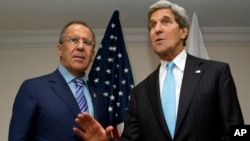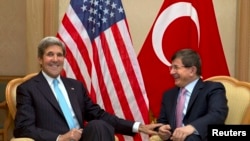BANDAR SERI BEGAWAN, BRUNEI —
U.S. Secretary of State John Kerry says planned peace talks for Syria may now be delayed until after August. He met separately with Turkish Foreign Minister Ahmet Davutoglu and Russian Foreign Minister Sergei Lavrov Tuesday about the conflict. Those talks came on the sidelines of a forum of South East Asian nations in Brunei.
Kerry said Russia and the United States have "the most significant difference" on the question of Syria but both are "more than serious, committed" to the process of getting the two sides in that country to talks on a transitional government.
"Our countries have an ability to be able to make a difference if we can pull together in that effort," Kerry noted.
Russia is supplying arms to forces loyal to Syrian President Bashar al-Assad. The United States says it is now ready to arm the rebellion against him. But Kerry said he and Lavrov are still pushing for those transitional government talks, narrowing some of the differences over a conference that Kerry says may be pushed back until after August.
"What is clear to me coming out of the meeting and what we both wanted to ascertain from each other is the level of seriousness and the capacity to be able to do this," he said.
Kerry said the success of talks planned in Geneva relies on a transitional government by mutual consent that has a full transfer of power, regardless of the military situation on the ground.
"Whether the Assad regime is doing better or whether the opposition is doing better is frankly not determinative of the outcome because the outcome requires a transition government. And that's why it is valuable to try to get to Geneva," Kerry explained.
Kerry added that he and Lavrov agree there is not a military victory in Syria that keeps it together as a country.
"And number two that we have an obligation to try to work toward a peaceful resolution," he stressed, "because a peaceful settlement is the best way to save the state of Syria and to minimize the destruction. That commitment remains a solid one between both of us."
Kerry said he raised with Lavrov the the issue of the former U.S. intelligence analyst Edward Snowden who is living in a Moscow airport transit lounge after leaking details of a U.S. surveillance program. Kery said Snowden is not Lavrov's portfolio so they did not discuss any substantive progress, but Kerry said he made clear how the issue fits into the U.S.-Russia relationship.
In Kerry's talks with the Turkish foreign minister, a senior State Department official said they focused on ways to strengthen Assad opponents and expand humanitarian assistance for civilians displaced by the fighting. Kerry and Davutoglu both expressed concern over attacks by Assad loyalists against civilians in the city of Homs and over what a U.S. official called "Hezbollah's continued violent and destabilizing interference in Syria."
Kerry said Russia and the United States have "the most significant difference" on the question of Syria but both are "more than serious, committed" to the process of getting the two sides in that country to talks on a transitional government.
"Our countries have an ability to be able to make a difference if we can pull together in that effort," Kerry noted.
Russia is supplying arms to forces loyal to Syrian President Bashar al-Assad. The United States says it is now ready to arm the rebellion against him. But Kerry said he and Lavrov are still pushing for those transitional government talks, narrowing some of the differences over a conference that Kerry says may be pushed back until after August.
"What is clear to me coming out of the meeting and what we both wanted to ascertain from each other is the level of seriousness and the capacity to be able to do this," he said.
Kerry said the success of talks planned in Geneva relies on a transitional government by mutual consent that has a full transfer of power, regardless of the military situation on the ground.
"Whether the Assad regime is doing better or whether the opposition is doing better is frankly not determinative of the outcome because the outcome requires a transition government. And that's why it is valuable to try to get to Geneva," Kerry explained.
Kerry added that he and Lavrov agree there is not a military victory in Syria that keeps it together as a country.
"And number two that we have an obligation to try to work toward a peaceful resolution," he stressed, "because a peaceful settlement is the best way to save the state of Syria and to minimize the destruction. That commitment remains a solid one between both of us."
Kerry said he raised with Lavrov the the issue of the former U.S. intelligence analyst Edward Snowden who is living in a Moscow airport transit lounge after leaking details of a U.S. surveillance program. Kery said Snowden is not Lavrov's portfolio so they did not discuss any substantive progress, but Kerry said he made clear how the issue fits into the U.S.-Russia relationship.
In Kerry's talks with the Turkish foreign minister, a senior State Department official said they focused on ways to strengthen Assad opponents and expand humanitarian assistance for civilians displaced by the fighting. Kerry and Davutoglu both expressed concern over attacks by Assad loyalists against civilians in the city of Homs and over what a U.S. official called "Hezbollah's continued violent and destabilizing interference in Syria."





